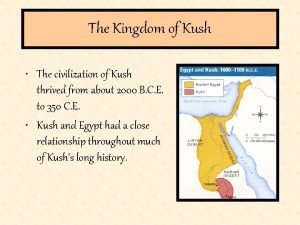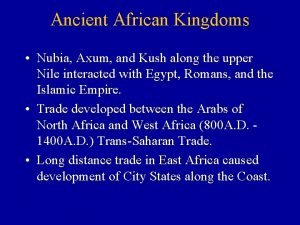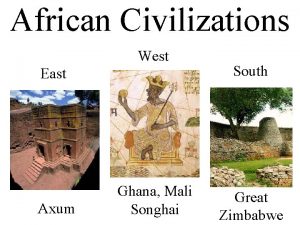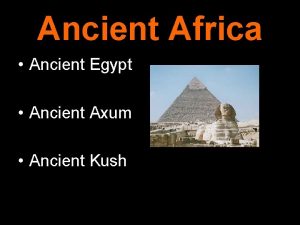African Civilizations Unit Five Kush and Axum Empires













- Slides: 13

African Civilizations Unit Five

Kush and Axum Empires Section One

Kushites Conquer the Nile For centuries, Egypt dominated Nubia and the Nubian kingdom of Kush, which lasted for about a thousand years between 2000 and 1000 BC. During this time, Egyptian armies raided and even occupied Kush for a brief period. But as Egypt fell into decline, Kush began to emerge as a regional power. Nubia lay south of Egypt on the first cataract of the Nile – where the river divided into the Blue Nile and the White Nile. The Nile served as a trade corridor for those in the area and Kush served as a trade corridor, linking Egypt and the Mediterranean to the interior of Africa and to the Red Sea.

Interaction of Egypt and Kush • Kush’s capital, Napata, became center for spread of Egyptian culture • With Egypt’s decline, Kush regained independence • In 751 BC, Kushite king named Piankhi united the entire northern Nile Valley

Kushite Golden Age In 671 BC, after fighting with neighbors to the east, the Kushites were forced to retreat south along the Nile. There, the Kushites experienced a golden age, despite their loss of Egypt. • Kushites moved south to Meroe • Kush used natural resources to thrive • Meroe became a major center for manufacture of iron weapons and tools • After 4 centuries of prosperity, Meroe began to decline • Axum began to dominate North African trade and defeated the Kush around 350 AD

Kingdom of Axum • Originally located south of Kush – in the Horn of Africa • Location and expansion made it key for caravan routes • Kingdom reached its height between 325 and 360 AD, when Ezana ruled • Axum lasted for 800 years • Finally declined under Muslim invaders when Axum moved its location and became geographically isolated

West African Civilizations Section Two

Kingdom of Ghana GHANA: war chief • By the 700 s, the kingdom of Ghana had been established • Rulers grew rich by taxing goods • Two most important trade items were gold and salt • Merchants traded goods in cities • Royal guards provided protection

Empire of Ghana • By 800, Ghana had become an empire • Ghana’s ruler acted as a religious leader, chief judge and military commander • Islam spread through North Africa by conquest, and south of the Sahara through trade • Ghana’s rulers eventually converted to Islam • In 1076, Berbers had taken over Ghana BERBER: member of a Muslim group in North Africa • Ghana never regained its power

Empire of Mali • By 1235, the kingdom of Mali had emerged • Mali’s wealth was built on gold SUNDIATA: Mali’s first great leader who came to power by crushing a cruel, unpopular ruler • Peace and prosperity existed during Sundiata’s rule

Mansa Musa • • Ruled from 1312 to 1332 Muslim ruler of Mali Sundiata’s grandnephew Doubled the size of the Empire • Went on a hajj from 132425 • Ordered new mosques built in Timbuktu • Timbuktu became one of the most important cities of the empire

Ibn Battuta • In 1352, Ibn Battuta visited the Empire of Mali • Traveled for 27 years, visiting most of the countries in the Islamic world • Visited Timbuktu and other cities of Mali

Empire of Songhai • Mali declined by the 1400 s • Songhai Empire was established with Gao as the capital • Two extraordinary rulers were Sunni Ali and Askia Muhammad • Despite wealth and learning, Songhai lacked modern weapons • Empire collapsed by 1600, ending the 1, 000 year period of rule by powerful kingdoms and empires in West Africa
 Maritime and land-based empires similarities
Maritime and land-based empires similarities Pinuno ng axum
Pinuno ng axum Ano ang unang estadong naitatag sa kanlurang africa?
Ano ang unang estadong naitatag sa kanlurang africa? Geography of axum
Geography of axum Map of kush
Map of kush Ancient egypt and kush map
Ancient egypt and kush map Nubia conquered egypt
Nubia conquered egypt Five elements and five senses
Five elements and five senses Kush
Kush Ovo cosmico vladimir kush
Ovo cosmico vladimir kush Reino de kush
Reino de kush Ismail kadare veprat kryesore
Ismail kadare veprat kryesore Kush nile river
Kush nile river Kush civilization facts
Kush civilization facts























